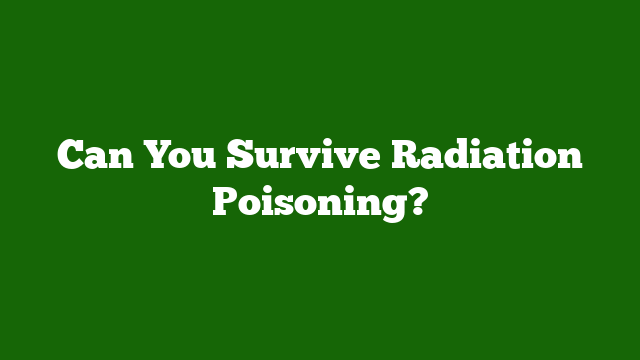Last Updated on June 12, 2023 by Umar
Radiation poisoning, also known as radiation sickness or acute radiation syndrome (ARS), is a severe and often fatal condition caused by a large dose of radiation absorbed by the body over a short period of time
. While it is a rare occurrence, it is essential to understand the experiences of those who have faced radiation poisoning, as well as the research and statistics surrounding this dangerous phenomenon.
Personal Stories
While personal stories of radiation poisoning survivors are scarce, the aftermath of events such as the atomic bombings of Hiroshima and Nagasaki and the Chernobyl nuclear disaster have left a lasting impact on the lives of those affected.
Survivors of these events have experienced both short-term and long-term mental health problems, including grief, fear, and anxiety
.
Research on Radiation Poisoning
Research on radiation poisoning has focused on understanding its causes, symptoms, and potential treatments.
For example, studies have examined the hematologic consequences of exposure to ionizing radiation
, as well as the risk of cancer following radiation exposure. Additionally, research has been conducted on the effects of electromagnetic fields on human safety.
Symptoms and Causes of Radiation Poisoning
Radiation sickness is caused by a large dose of radiation absorbed by the body, often received over a short period of time
. Symptoms of radiation poisoning can vary depending on the dose and type of radiation exposure.
In cases of high radiation exposure, tremors, convulsions, coma, and death can occur within three days. Gastrointestinal sickness, characterized by intractable nausea, vomiting, electrolyte imbalance, and diarrhea, can occur when the total dose of radiation is lower but still high (400 or more rads) .
Treatments for Radiation Poisoning
Treatments for radiation poisoning depend on the type of radioactive material involved.
Some medical treatments are available for limiting or removing internal contamination, which occurs when radioactive materials enter the body through breathing, open wounds, or consumption of contaminated food or water
. In cases of external contamination, it is crucial to remove outer layers of clothing and wash any exposed body parts to limit radiation exposure and prevent the spread of radioactive material.
Prevention and Preparedness
Preventing radiation poisoning involves being prepared for potential radiation emergencies.
Ready.gov provides resources and information on how to prepare for and respond to radiation emergencies, including guidance on sheltering in place and decontamination procedures
. The Centers for Disease Control and Prevention (CDC) also offers information on medical countermeasures for radiation exposure and contamination.In conclusion, surviving radiation poisoning is a challenging and often traumatic experience.
While cases of radiation sickness are rare, understanding the personal stories, research, and statistics surrounding this dangerous condition is essential for raising awareness and promoting preparedness.
Helpful Resources
- https://www.mayoclinic.org/diseases-conditions/radiation-sickness/symptoms-causes/syc-20377058
- https://rarediseases.org/rare-diseases/radiation-sickness/
- https://www.cdc.gov/nceh/radiation/emergencies/countermeasures.htm
- https://www.cdc.gov/nceh/radiation/emergencies/getinside.htm
- https://www.ready.gov/radiation

